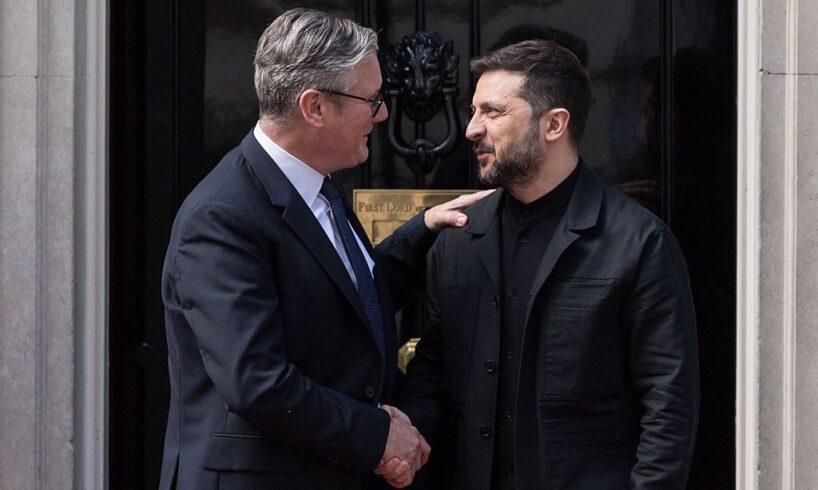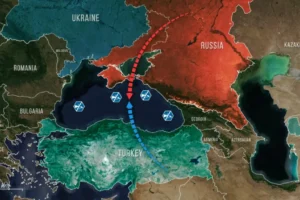
Key developments on Sept. 17:
Ukraine ratifies historic 100-year partnership with UKIAEA reports shelling, black smoke near Russian-occupied Zaporizhzhia nuclear plantPro-Ukraine partisans sabotage railway, disrupt Russian logistics 1,600 km from border, group claimsUkraine captures Kenyan serving in Russian army, who claims he was tricked into joiningRussia preparing 2 more ‘heavy offensive campaigns,’ Zelensky says
The Ukrainian parliament on Sept. 17 ratified a 100-year partnership agreement with the U.K., marking a deepening relationship between the two countries.
The wide-ranging deal, signed by President Volodymyr Zelensky and U.K. Prime Minister Keir Starmer in January, encompasses cooperation in military, energy, scientific, cultural, economic, and other sectors.
The document provides for an increased British military support for Ukraine, allocating at least 3.6 billion British pounds ($4.9 billion) per year until the fiscal year 2030/2031, “and thereafter as needed,” the Ukrainian parliament said.
This assistance includes training for Ukrainian soldiers and pilots, military aviation supplies, expanded defense industry cooperation, and involvement in joint formats like the U.K.-led Joint Expeditionary Force.
According to the British government, the agreement will formalize the “unbreakable bonds between the U.K. and Ukraine.”
“This is more than a partnership. This is an alliance for the century, strengthening our defense, development, and peaceful future in Europe,” Ukrainian Parliament Speaker Ruslan Stefanchuk commented.
The agreement builds upon the trade and partnership agreement signed by the two countries in 2020 and the bilateral security deal signed in January 2024.
The bill on the agreement’s ratification was supported by 295 lawmakers. According to the bill’s explanatory note, the move will ensure the completion of all domestic procedures needed to launch the partnership deal.
The British parliament completed its review of the treaty on May 1, clearing the way for the U.K. government to ratify it.
Russia’s drone incursion into Poland skirted the line of NATO’s escalation policy
Russia and NATO are currently in the most open confrontation since the collapse of the Soviet Union ended the Cold War — but only one side seems to be acknowledging it. The incursion of 21 Russian drones into Polish airspace on Sept. 9 — unprecedented in the history of Moscow’s relations with NATO — has brought the prospects of a direct military exchange between the two adversaries into the forefront. “Even though NATO is not at war, Russian aggression strikes beyond Ukraine,” Polish Foreign M
IAEA reports shelling, black smoke near Russian-occupied Zaporizhzhia nuclear plant
The International Atomic Energy Agency (IAEA) reported on Sept. 16 that shelling occurred near the Russian-occupied Zaporizhzhia Nuclear Power Plant, Europe’s largest nuclear facility.
“What was once virtually unimaginable — shelling or other military activity taking place close to major nuclear facilities — has become a regular occurrence during this horrific war,” IAEA Director General Rafael Grossi said.
IAEA observers saw “black smoke rising from three locations nearby” after the shelling, according to the agency. The Russian-installed management of the plant informed the agency that artillery shells landed about 400 meters (1,310 feet) from the facility’s off-site diesel fuel storage.
The agency did not attribute responsibility, though Moscow accused Ukraine.
The Zaporizhzhia plant, located in the Russian-occupied city of Enerhodar, produced around 20% of Ukraine’s electricity before Russia seized it in March 2022.
Russia’s gains speed up in Ukraine ahead of high-stakes autumn
Amid a flurry of activity in the geopolitical arena without much real progress toward peace, the fourth summer of Russia’s full-scale war has come and gone on the battlefield. Not showing any real intent to stop its war in peace negotiations, Moscow has continued to pursue offensive operations at a high intensity across the front line. The partially occupied far eastern Donetsk Oblast — in the spotlight internationally as the subject of Russian demands for it to be handed over as part of a sup
Pro-Ukraine partisans sabotage railway, disrupt Russian logistics 1,600 km from border, group claims
Atesh partisans sabotaged railway infrastructure in the Russian city of Yekaterinburg, disrupting Russian military logistics, the group claimed on Sept. 17.
An agent of the Ukrainian-founded partisan group set fire to a relay cabinet, Atesh said, publishing footage of the burning equipment at night.
Yekaterinburg, Russia’s fourth-largest city and the regional center of Sverdlovsk Oblast, lies far from the front lines in Ukraine, almost 1,600 kilometers (1,000 miles) from the nearest Ukrainian border.
“Ammunition, armored vehicles, fuel, and personnel bound for the front — as well as shipments to factories and depots in the north and east — passed through this junction,” Atesh said.
“Now military trains are idling, which is damaging the (Russian) army’s rear supply lines,” Atesh said.
The Kyiv Independent could not verify the claims.
‘Opinion is shifting towards this idea,’ says Polish FM Sikorski on NATO closing the sky over western Ukraine
Russia has faced little to no consequences following its brazen Sept. 10 attack on Poland, yet Polish Foreign Minister Radoslaw Sikorski is upbeat about NATO’s response and how things have played out since. “I think Russia lost this confrontation,” Sikorski told the Kyiv Independent in an interview on the sidelines of the Yalta European Strategy (YES) conference held in Kyiv on Sept 12-13. Poland downed only four out of 19 drones that entered its airspace, with one of the drones falling nearly
Ukraine captures Kenyan serving in Russian army, who claims he was tricked into joining
Ukrainian soldiers captured a Kenyan citizen serving in the Russian army in Kharkiv Oblast, near the town of Vovchansk, the 57th Motorized Infantry Brigade reported on Sept. 17.
The man, who identified himself as Evans and said he was an athlete in civilian life, said he traveled to Russia as a tourist and was deceived into joining the Russian army.
This case highlights a broader pattern of Russia recruiting foreigners to fight against Ukraine, sometimes through deceptive methods.
“I ended up in Russia without knowing that I had been enlisted in the Russian army. I had never served before,” Evans said in a video released by the brigade. “I didn’t go to Russia for that.”
According to Evans, the man who hosted him in Russia offered him a “job” and gave him documents to sign, which turned out to be a military contract.
“After I signed, he took my passport and phone, saying he would return them. From that moment on, other people came for me. They told me to get in the car,” he added.
After just a week of basic training, he was sent to a military camp, where Evans described chaotic conditions, with orders shouted while soldiers were grabbed by their clothes.
Fearing for his life, Evans fled to Ukrainian troops, who gave him food and water. He said that if he had returned to the Russian army, he would have been killed.
The man said other recruits also included Russians, Belarusians, Tajiks, and other Africans.
Testing NATO, Russia’s ‘salami slicing tactics’ now threaten Poland, Baltic states
Russia’s “unprecedented” drone attack on Poland last week has once again thrust a curious-sounding geopolitical phrase into the spotlight — salami slicing tactics. Salami slicing tactics is a term commonly used in geopolitics and military strategy to describe a method of achieving a larger objective through a series of small, incremental actions — each carefully calibrated to avoid provoking a strong or immediate response. “They’re poking,” former U.K. Prime Minister Boris Johnson told the Kyi
Russia preparing 2 more ‘heavy offensive campaigns,’ Zelensky says
Russian forces are preparing two more large-scale offensives after three failed campaigns this year, President Volodymyr Zelensky said in an interview with Sky News published on Sept. 16.
“They are preparing for two more offensive operations in the fall,” Zelensky said. “There were already three of them, and ahead… there are two more heavy offensive campaigns.”
The remarks follow earlier reporting that Russian President Vladimir Putin told U.S. officials he aims to capture the entire Donbas region in eastern Ukraine by the end of 2025. According to Reuters’ sources, Putin believes his forces are “winning” despite limited gains.
Since November 2022, Moscow has gained less than 1% of additional Ukrainian territory, despite its 2025 summer offensive advancing at one of the fastest rates since late 2024.
Zelensky attributed Russian military setbacks to significant manpower and equipment losses.
“They lost because there were a large number of casualties among the personnel and a large number of lost equipment,” he added. “What I said to the Europeans and what I said in the White House… the Russians will not be able to take our east.”
Zelensky also dismissed claims that Russia could capture cities like Sumy in the northeast as “lies and manipulation.”
Note from the author:
Ukraine War Latest is put together by the Kyiv Independent news desk team, who keep you informed 24 hours a day, seven days a week. If you value our work and want to ensure we have the resources to continue, join the Kyiv Independent community.





